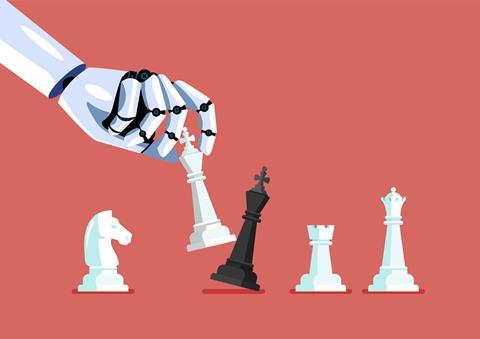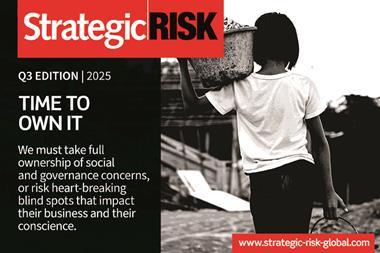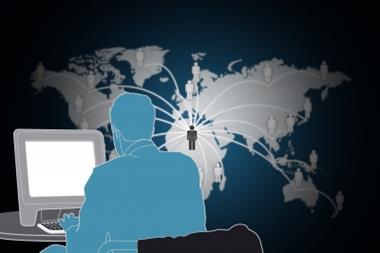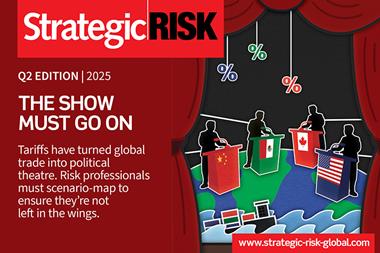Horst Simon, founder of The Risk Culture Builders, explores the new skills that risk practitioners will need to survive and thrive through the fifth industrial revolution
The world is in a revolutionary transformation marked by the seamless integration of humans and artificial intelligence (AI) in the workplace.
Spearheaded by thought leaders such as John Nosta, the Fifth Industrial Revolution is set to usher in an era where humans and AI collaborate synergistically, redefining the way we work, innovate, and live.

Nosta has aptly named this period the “Cognitive Age,” signifying the unprecedented fusion of human intellect and artificial intelligence capabilities.
Industrial revolutions highly impact the Global workforce and the skills requirements of every occupation.
Many businesses implement appropriate actions to gain competitive advantages and take the lead of the market, whilst others do not even recognise the pace of change brought by the industrial revolutions and digital transformations.
Transformation of the management of risk
The Fifth Industrial Revolution marks a profound shift in the relationship between humans and AI and will transform the way we think about the management and optimisation of risk.
By embracing augmented intelligence, prioritising human-centric design, upholding ethical standards, and fostering continuous learning; society can harness the full potential of the Cognitive Age, unlocking unprecedented possibilities for innovation, productivity, and human advancement; but not without an increased exposure to new risks.
- Data-driven decision-making: One of the fundamental aspects of the Fifth Industrial Revolution is the unprecedented access to vast amounts of data. In the realm of risk management, this translates to a shift from intuition-based decision-making through human perception; to AI-enhanced decision-making by adding data-driven strategies. Advanced analytics and AI algorithms can process and analyse enormous datasets in real-time, providing businesses with actionable insights to optimise the effective management of risk.
- Predictive analytics and forecasting: The Cognitive Age equips businesses with predictive analytics tools that go beyond traditional risk assessment methods. Machine learning algorithms will analyse historical data, identify patterns, and predict future risks with a much higher degree of accuracy. This enables organisations to proactively address potential challenges before they escalate, fostering a more proactive and preventive approach to the management of risk.
- Enhanced cybersecurity measures: With the increasing digitisation of business operations, the risk landscape has expanded to include sophisticated cyber threats. The Fifth Industrial Revolution emphasises the integration of advanced cybersecurity measures powered by AI. Intelligent algorithms will detect anomalies, identify potential vulnerabilities, and respond to cyber threats in real-time, fortifying businesses against the ever-evolving landscape of cyber risks.
- Automation in compliance and regulation: Compliance and regulatory requirements are integral aspects of risk management. The Cognitive Age streamlines compliance processes by automating routine tasks such as monitoring regulatory changes, updating policies, and ensuring adherence to industry standards. Business leaders will find themselves in a lose-lose environment of higher policy uncertainty and regulatory risk, but AI-driven compliance tools will reduce the risk of regulatory breaches and also enhance the efficiency of compliance management.
- Scenario modelling and stress testing: This Cognitive Age introduces sophisticated tools for scenario modelling and stress testing. AI algorithms can simulate various scenarios and assess the potential impact on business operations. This enables organisations to develop robust contingency plans and strategies to navigate through challenging situations, ensuring resilience in the face of unforeseen risks.
- Human-AI collaboration in decision-making: While AI plays a crucial role in data analysis and risk prediction, the human expertise remains invaluable in interpreting results, making strategic decisions, and understanding the broader context. The Fifth Industrial Revolution emphasises the collaboration between humans and AI in the management of risk, combining the analytical capabilities of AI with human intuition and experience to make well-informed risk management decisions, take better opportunities for reward and build sustainable competitive advantage.
- Ethical considerations in risk management: As businesses leverage AI for risk management, serious and important ethical considerations come to the forefront. Ensuring transparency, fairness, and accountability in AI-driven decision-making processes is crucial. Businesses must establish ethical frameworks that guide the responsible use of AI in the process to optimise the management of risk, addressing concerns related to bias, privacy, and the ethical implications of automated decision-making.
As organisations adapt to the Cognitive Age, the proactive integration of these technologies will not only mitigate risks but also unlock new opportunities for innovation and sustainable growth.
Essential Skills for the effective management of risk in the fifth industrial revolution
As the world enters the era of the Fifth Industrial Revolution with a risk landscape that is undergoing a profound transformation and the effective management of existing and new risks is key to the resilience and sustainability of all businesses and organisations we need to change the way we think.
To effectively navigate the challenges and opportunities presented by this cognitive age, professionals in risk management must cultivate a diverse set of new skills and advance in the knowledge and application of existing skills.
Let us look at the key competencies and capabilities individuals need to excel in the management of risk within the context of the Fifth Industrial Revolution.
- Data literacy and analytics skills:
Data is the lifeblood of the effective management of risk. Risk Practitioners must be adept at interpreting and leveraging vast datasets. Data literacy skills, including the ability to extract meaningful insights and identify patterns, are crucial. Proficiency in analytics tools and an understanding of statistical concepts empower risk managers to make informed decisions based on data-driven assessments.
- AI and technology proficiency:
As AI becomes an integral part of risk management processes, practitioners need a solid understanding of AI technologies and their applications. Familiarity with machine learning algorithms, automation tools, and AI-driven analytics platforms is essential for leveraging these technologies to enhance risk assessment, prediction, and mitigation strategies.
- Cybersecurity expertise:
With the increasing digitisation of business processes, cybersecurity has become a critical component of risk management. Risk Practitioners should possess expertise in cybersecurity measures, including knowledge of encryption, network security, and threat detection. Understanding the evolving landscape of cyber threats enables risk managers to implement robust cybersecurity protocols.
- Critical thinking and problem-solving:
The ability to analyse complex situations, think critically, and solve problems is a timeless skill, but it is particularly crucial in the Cognitive Age. Risk managers must be adept at assessing multifaceted risks, identifying root causes, and developing innovative solutions. Critical thinking enables professionals to navigate uncertainties and make well-informed decisions.
- Communication and stakeholder management:
Effective communication is vital for risk managers in the Fifth Industrial Revolution. Risk Practitioners should be able to convey complex risk information in a clear and understandable manner to diverse stakeholders. Strong communication skills foster collaboration, enhance transparency, and facilitate the integration of risk management into organisational decision-making processes.
- Adaptability and continuous learning:
The pace of technological change in the Fifth Industrial Revolution requires risk managers to be highly adaptable. A commitment to continuous learning is essential to stay abreast of emerging technologies, industry trends, and evolving risk landscapes. Professionals who embrace a growth mindset and actively seek opportunities for upskilling will thrive in this dynamic environment.
- Ethical decision-making:
The ethical implications of risk management decisions are increasingly significant in the Cognitive Age. Professionals must be well-versed in ethical considerations related to AI, data privacy, and the responsible use of technology. Upholding ethical standards ensures that risk management practices align with societal values and legal frameworks.
- Collaboration and teamwork:
The integration of AI does not diminish the importance of human collaboration. Risk managers must excel in working collaboratively with interdisciplinary teams, including data scientists, cybersecurity experts, and business leaders. Teamwork enhances the collective intelligence applied to risk assessment and fosters a holistic approach to the effective management of risk.
The way forward
The Fifth Industrial Revolution presents both challenges and opportunities for risk practitioners.
By cultivating their diverse skills that includes data literacy, AI proficiency, cybersecurity expertise, critical thinking, effective communication, adaptability, continuous learning, and ethical decision-making, they can position themselves as invaluable assets in navigating the complex risk landscapes of the Cognitive Age.
As the role of risk management evolves, these skills will empower professionals to proactively optimise the management of risk, adding value and contributing to the resilience and success of organisations in the era of the Fifth Industrial Revolution.
Source














1 Readers' comment